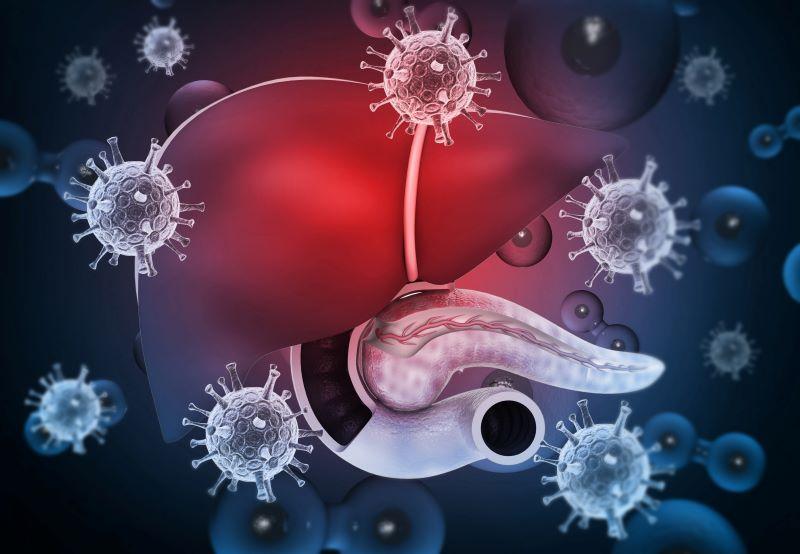Get Healthy!

- Kirstie Ganobsik
- Posted July 6, 2023
Learn the Differences Between Hepatitis A, B, C, D & E
Curious about what the differences are between hepatitis A, B, C, D and E? If so, you've come to the right place. Here, experts break down hepatitis infection by type to reveal what it is, the most common symptoms, how it's transmitted and the options available to treat it.
Hepatitis A
Hepatitis is a viral infection of the liver that causes liver inflammation, according to the U.S. Centers for Disease Control and Prevention. A hepatitis A infection is caused by the hepatitis A virus (HAV), which is very contagious, although there is a vaccine available to prevent it.
"Hepatitis A is spread through contaminated food and water, not through blood or sexual intercourse,"explained Dr. Melissa Jenkins, chief of the division of infectious diseases at Cleveland's MetroHealth Medical Center.
The CDC notes that HAV may also be transmitted through close contact with someone who has been infected with the virus.
Hepatitis A symptoms may last up to two months and include:
- Fatigue
- Nausea
- Abdominal pain
- Jaundice
"There are no treatments for hepatitis A, except for supportive care [such as] medication for nausea [and] intravenous fluids,"explained Jenkins, who is also an associate professor at Case Western Reserve University School of Medicine, in Cleveland.
She added that "hepatitis A does not cause a chronic infection like hepatitis B and C. Once people recover from hepatitis A, they do not have any long-term liver complications and are immune."
Hepatitis B
Like hepatitis A, hepatitis B is vaccine preventable. The CDC states that it's caused by the hepatitis B virus (HBV).
Jenkins explained that HBV "is spread through contact with blood or through sexual intercourse. It can also be spread from mother to child."
According to the CDC, symptoms of HBV may include:
- Fatigue
- Nausea
- Vomiting
- Fever
- Abdominal pain
- Jaundice
- Joint pain
- Dark-colored urine
- Light-colored stool
"Most people who catch it do not have any symptoms at the time of infection, but some will have symptoms like we see with hepatitis C,"Jenkins noted.
The Mayo Clinic and CDC state that HBV may be treated with:
- An immunoglobin injection within 24 hours of infection
- Supportive care for acute (short-term) infections, including rest, fluids and monitoring of the infection
Treatments for chronic (long-term) HBV infection may include:
- Antiviral medications
- Interferon injections
- A liver transplant if the virus progresses and causes severe liver damage
"About 5% to 10% of adults do develop a chronic infection with hepatitis B. If people get hepatitis B as a child, it is much more likely that they will develop a chronic infection,"Jenkins said.
"Not all people with chronic infection need treatment right away, but they need to see a doctor regularly to check their status,"she advised.
Hepatitis C
The CDC says that hepatitis C is unique from hepatitis A and B in that over half the infections are long-term (chronic), and there's also no vaccine for it. The infection is caused by the hepatitis C virus (HCV).
Having symptoms of acute HCV is not common, but you may experience:
- Loss of appetite
- Yellow skin and eyes (jaundice)
- Vomiting
- Abdominal pain
- Fever
- Dark-colored urine
- Light-colored stool
- Fatigue
- Joint pain
Chronic HCV symptoms are also uncommon but may include:
- Chronic fatigue
- Depression
"Hepatitis C is spread through contact with someone else's blood,"Jenkins explained. "Current ways people get it are through sharing needles or paraphernalia for injecting or snorting drugs; tattoos, especially ones done in non-professional settings; or occupational exposures, like a health care worker who has a needlestick."
She added that it may also be transmitted from mother to child during pregnancy, but "is not transmitted very well through sex between a man and woman. Sex between men has a much higher chance of transmitting hepatitis C."
According to the CDC and Hepatitis C Online, there are a number of antiviral medications available to treat HCV. In more severe cases, it may also be treated with liver transplant surgery.
Hepatitis D
Only people who have had hepatitis B may contract the hepatitis D virus (HDV). For this reason, it's known as a "satellite virus"according to the CDC. It also has symptoms similar to HBV.
"This is a rapidly progressive disease,"explained Hepatitis B Foundation medical director Dr. Robert Gish, in a Liver Foundation webinar. He advised that this is why all patients with HBV should also be tested for HDV.
The CDC states that the only treatment for HDV is a drug called pegylated interferon alpha.
Hepatitis E
"Hepatitis E is very similar to hepatitis A. It's spread through contaminated food and water,"said Jenkins.
She noted that the following symptoms may indicate a hepatitis E infection:
- Jaundice
- Nausea
- Vomiting
- Abdominal pain
"There are no treatments for hepatitis E other than supportive care,"Jenkins explained, although she also said it's not a common infection in the United States.
According to the CDC, most people make a full recovery from hepatitis E virus (HEV) infection.
SOURCE: Melissa Jenkins, MD, chief, division of infectious diseases, MetroHealth Medical Center, and associate professor, Case Western Reserve University School of Medicine, Cleveland, Ohio





